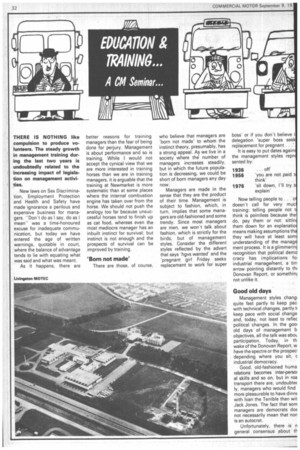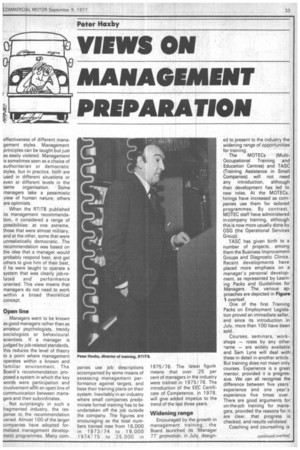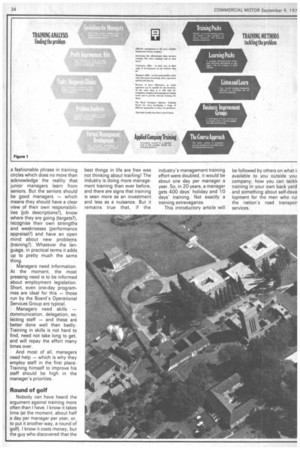THERE IS NOTHING like compulsion to produce volunteers. The steady
Page 34

Page 35

Page 36

If you've noticed an error in this article please click here to report it so we can fix it.
growth in management training during the last two years is undoubtedly related to the increasing impact of legislation on management activities.
New laws on Sex Discrimination, Employment Protection and Health and Safety have made ignorance a perilous and expensive business for managers. "Don't do as I say, do as I mean" was a time-honoured excuse for inadequate communication, but today we have entered the age of written warnings, quotable in court, where the balance of advantage tends to lie with equating what was said and what was meant.
As it happens, there are better reasons for training managers than the fear of being done for perjury. Management is about performance and so is training. While I would not accept the cynical view that we are more interested in training horses than we are in training managers, it is arguable that the training at Newmarket is more systematic than at some places where the internal combustion engine has taken over from the horse. We should not push the analogy too far because unsuccessful horses tend to finish up as cat food, whereas even the most mediocre manager has an inbuilt instinct for survival; but instinct is not enough and the prospects of survival can be improved by training.
'Born not made'
There are those, of course, who believe that managers are 'born not made' to whom the instinct theory, presumably, has a strong appeal. As we live in a society where the number of managers increases steadily, but in which the future population is decreasing, we could be short of born managers any day now.
Managers are made in the sense that they are the product of their time. Management is subject to fashion, which, in turn, implies that some managers are old-fashioned and some trendy. Since most managers are men, we won't talk about fashion, which is strictly for the birds, but of management styles. Consider the different styles reflected by the advert that says 'hgvs wanted' and the 'pregnant girl Friday seeks replacement to work for super boss' or if you don't believe delegation 'super boss see rePlacement for pregnant. . .
It is easy to put dates again the management styles repr sented by:
1936 ... off' 1956 'you are not paid t
think'
1976 'sit down, I'll try t explain'
Now telling people to . . o doesn't call for very muc training: telling people not t think is poiniless because the do, pay them or not: sittin them down for an explanatio means making assumptions th they will have at least som understanding of the manag ment process. It is a glimmerin recognition that political demo cracy has implications fo, industrial manager'nent, a tin' arrow pointing distantly to thi Donovan Report, or sornethinc not unlike it.
Good old days
Management styles chang, quite fast partly to keep pac with technical changes, partly t, keep pace with social change and, today, not least to reflec political changes. In the goo, old days of management b objectives, all the talk was aboi. participation. Today, in th wake of the Donovan Report, w have the spectre or the prospec. depending where you sit, c industrial democracy.
Good, old-fashioned huma relations becomes inter-persor at skills and so on, but in roa transport there are, undoubtec ly, managers who would find more pleasurable to have dinnE with Ivan the Terrible than wit Jack Jones. The fact that som managers are democrats doe not necessarily mean that nor is an autocrat.
Unfortunately, there is n general consensus about tF
effectiveness of different management styles. Management principles can be taught but just as easily violated. Management is sometimes seen as a choice of authoritarian or democratic styles, but in practice, both are used in different situations or even at different levels in the same organisation. Some managers take a pessimistic view of human nature; others are optimists.
When the RTITB published its management recommendation, it considered a range of possibilities: at one extreme, those that were almost military, and at the other, some that were unrealistically democratic. The recommendation was based on the idea that a manager would probably respond best, and get others to give him of their best, if he were taught to operate a system that was clearly job-re lated and performance oriented. This view means that managers do not need to work within a broad theoretical concept.
Open line
Managers want to be known as good managers rather than as amateur psychologists, trendy sociologists or behavioural scientists. If a manager is judged by job-related standards, this reduces the level of theory to a point where management operates within a known and familiar environment. The Board's recommendation proposed a system in which the key words were participation and involvement with an open line of communication between managers and their subordinates.
Not surprisingly in such a fragmented industry, the response to the recommendation varied. Almost 100 of the larger companies have adopted forrealised management development programmes. Many corn ponies use job descriptions accompanied by some means of assessing management performance against targets, and base their training plans on their system_ Inevitably in an industry where small companies predominate formal training has to be undertaken off the job outside the company. The figures are encouraging as the total numbers trained rose from 16,000 in 1 9 7 3 / 74 to 19,000 1974/75 to 25.000 in
1975/76. The latest figure means that over .25 per cent of managers in th4 industry were trained in 1975/76. The introduction of the EEC Certificate of Competence, in 1978, will give added impetus to the trend of the last three years.
Widening range
Encouraged by the growth in management training, the Board launched its 'Manager 77' promotion, in July, design ed to present to the industry the widening range of opportunities for training.
The MOTECs (MultiOccupational Training and Education Centres) and TASC (Training Assistance in Small Companies) will not need any introduction, although their development has led to new roles. At the MOTECs, hirings have increased as companies use them for tailored programmes. By contrast, MOTEC staff have administered in-company training, although this is now more usually done by
OSG Operational Services Group).
TASC has given birth to a number of projects, among them the Business Improvement Groups and Diagnostic Clinics. Recent developments have placed more emphasis on a manager's personal development, as represented by Learning Packs and Guidelines for Managers. The various approaches are depicted in Figure 1 overleaf.
One of the first Training Packs on Employment Legislation proved an immediate seller, and since its introduction in July, more than 100 have been sold.
Courses, seminars, workshops — roses by any other name — are widely available and Sam Lyne will deal with these in detail in another article. But training does not mean only courses. Experience is a great mentor, provided it is progressive. We can all recognise the difference between five years' experience and one year's experience five times over. There are good arguments for on-the-job training for managers, provided the reasons for it are clear, that progress is checked, and results validated.
Coaching and counselling is a fashionable phrase in training circles which does no more than acknowledge the reality that junior managers learn from seniors. But the seniors should be good managers — which means they should have a clear view of their own responsibilities (job descriptions?), know where they are going (targets?), recognise their own strengths and weaknesses (performance appraisal?) and have an open mind about new problems (training?). Whatever the language, in practical terms it adds up to pretty much the same thing.
Managers need information. At the moment, the most pressing need is to be informed about employment legislation. Short, even one-day programmes are ideal for this — those run by the Board's Operational Services Group are typical.
Managers need skills — communication, delegation, se: lecting staff — and these are better done well than badly. Training in skills is not hard to find, need not take long to get, and will repay the effort many times over.
And most of all, managers need help — which is why they employ staff in the first place.Training himself to improve his staff should be high in the manager's priorities.
Round of golf
Nobody can have heard the argument against training more often than I have. I know it takes time (at the moment, about half a day per manager per year, or, to put it another way, a round of golf). I know it costs money, but the guy who discovered that the best things in life are free was not thinking about training! The industry is doing more management training than ever before, and there are signs that training is seen more as an investment and less as a nuisance. But it remains true that, if the industry's management training effort were doubled, it would be about one day per manager a year. So, in 20 years, a manager gets 400 days' holiday and 10 days' training. Not exactly a training extravaganza.
This introductory article will be followed by others on what i! available to you outside you company; how you can tacklt training in your own back yard and something about self-deve lopment for the men who rut the nation's road transpor services.
















































































































